Unit 12 What did you do last weekend Section A (Grammar Focus-3c)课件(共43张PPT)2023--2024学年人教版英语七年级下册
文档属性
| 名称 | Unit 12 What did you do last weekend Section A (Grammar Focus-3c)课件(共43张PPT)2023--2024学年人教版英语七年级下册 | 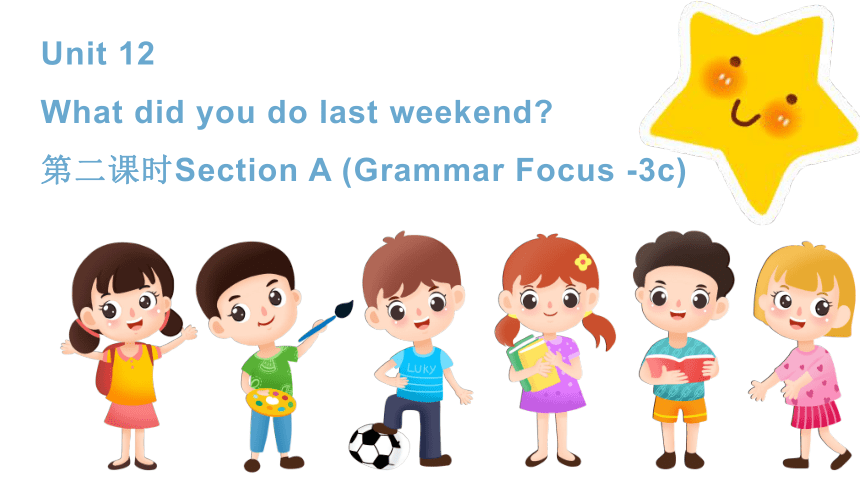 | |
| 格式 | pptx | ||
| 文件大小 | 14.4MB | ||
| 资源类型 | 教案 | ||
| 版本资源 | 人教新目标(Go for it)版 | ||
| 科目 | 英语 | ||
| 更新时间 | 2024-03-04 15:37:54 | ||
图片预览


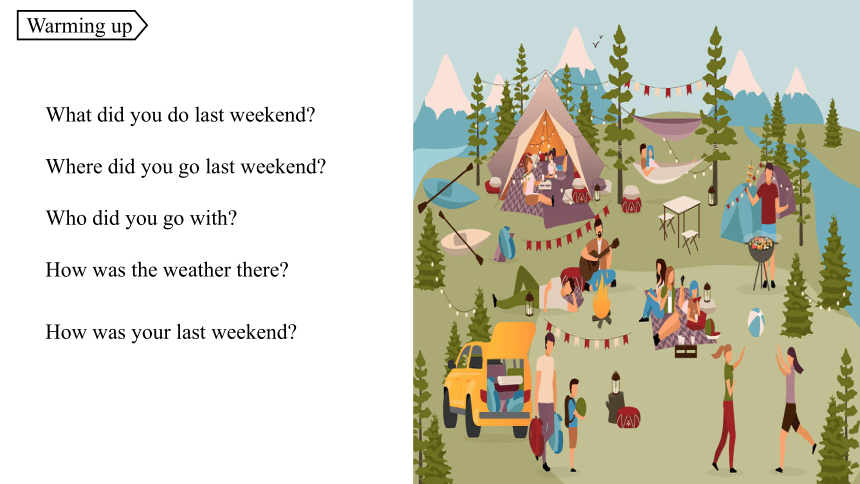
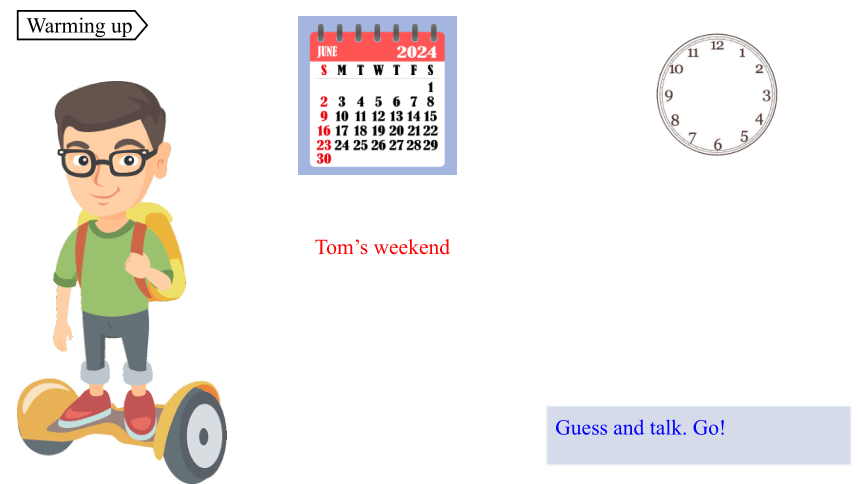
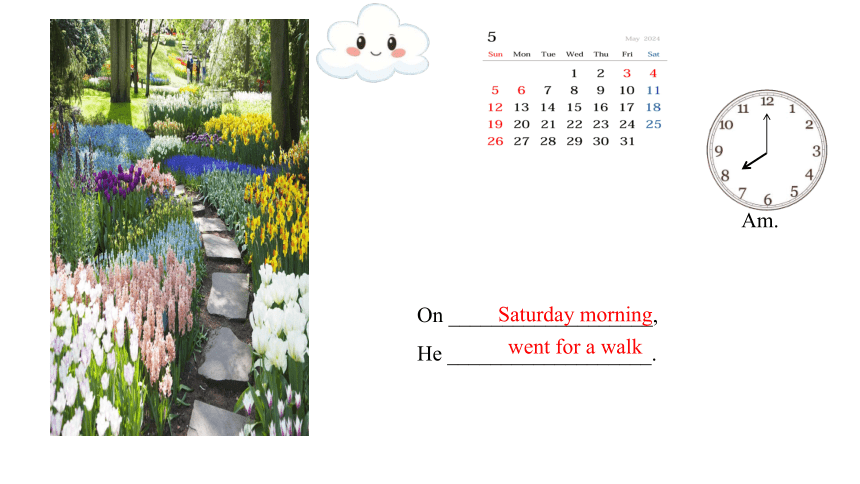
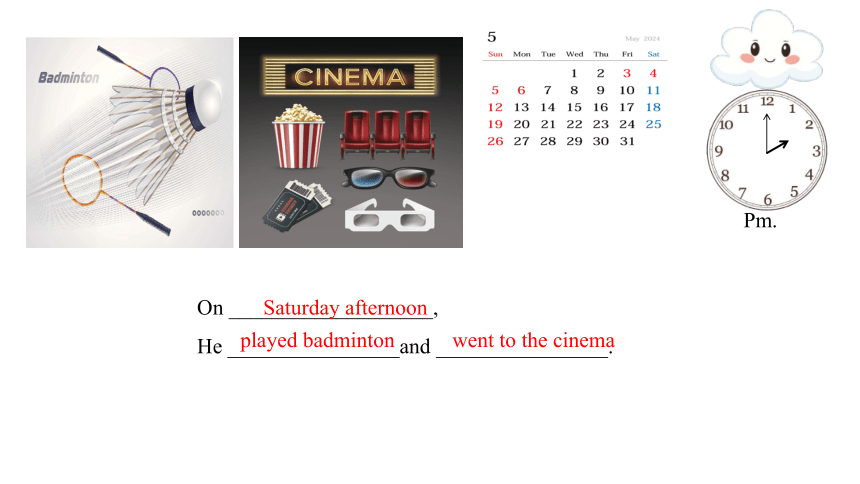
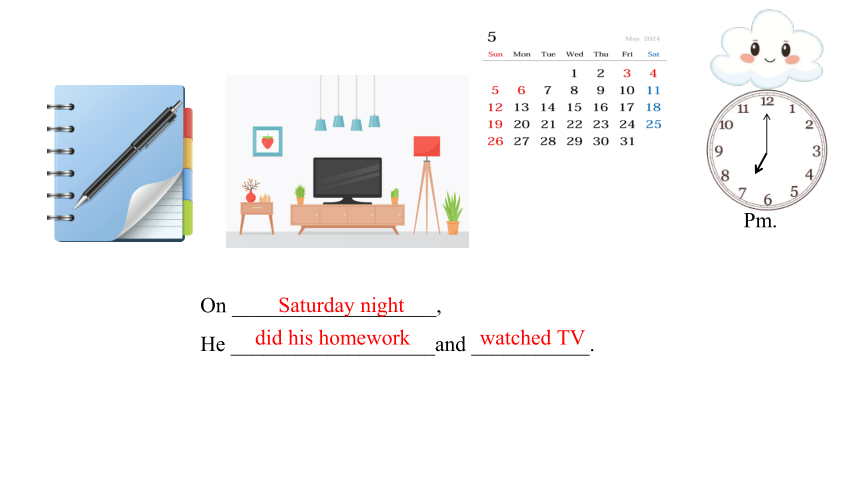
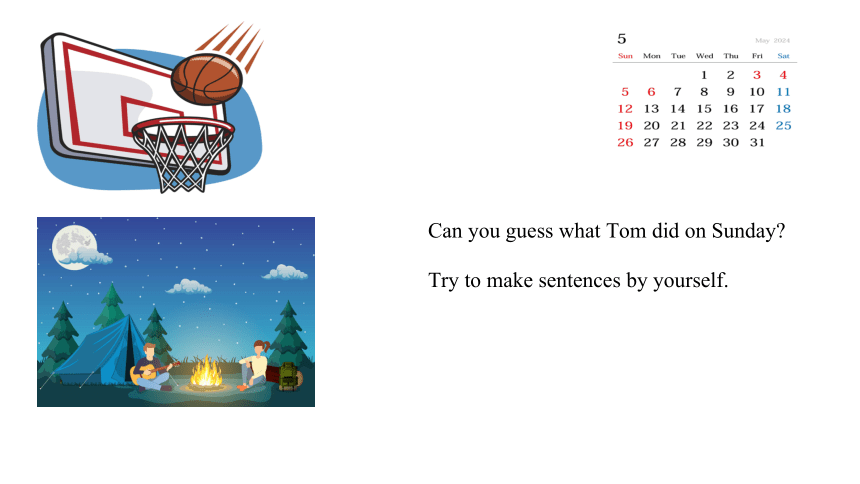
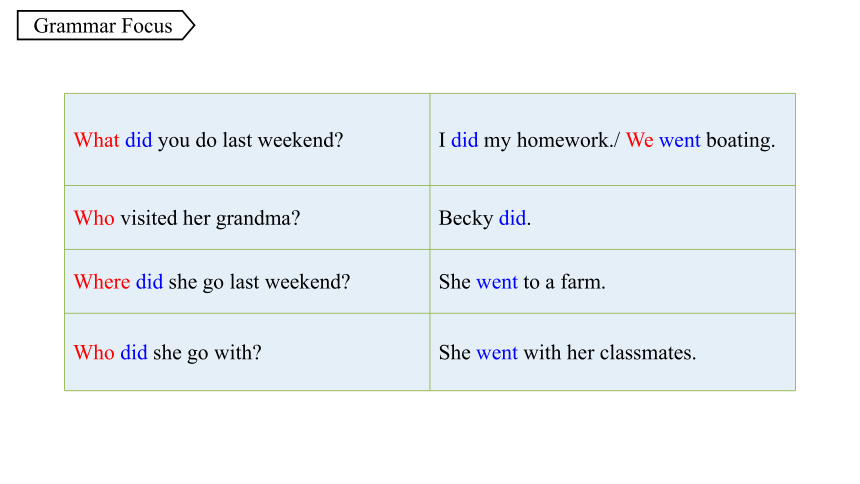
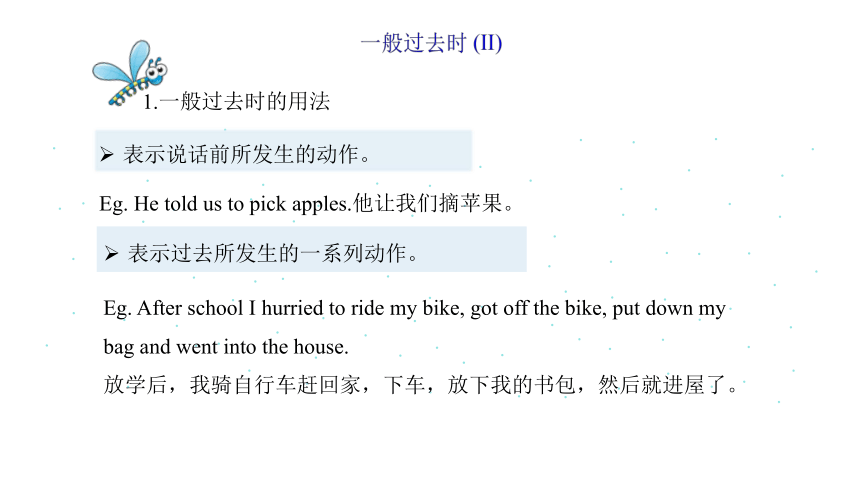
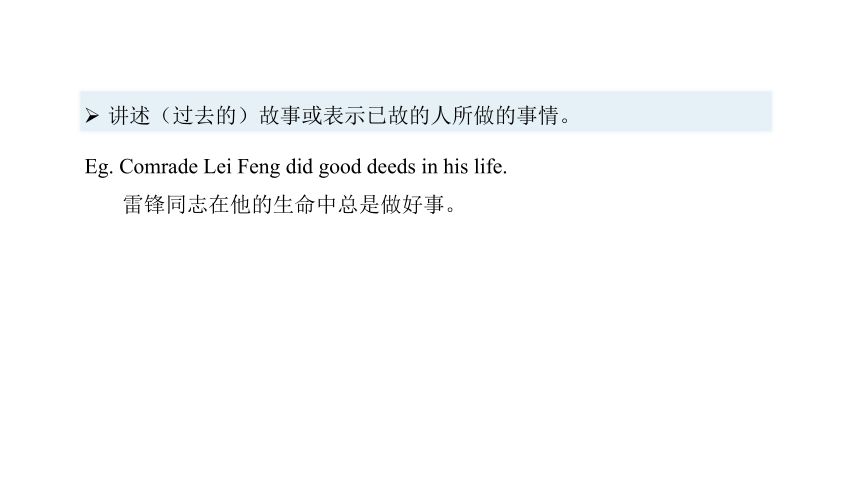
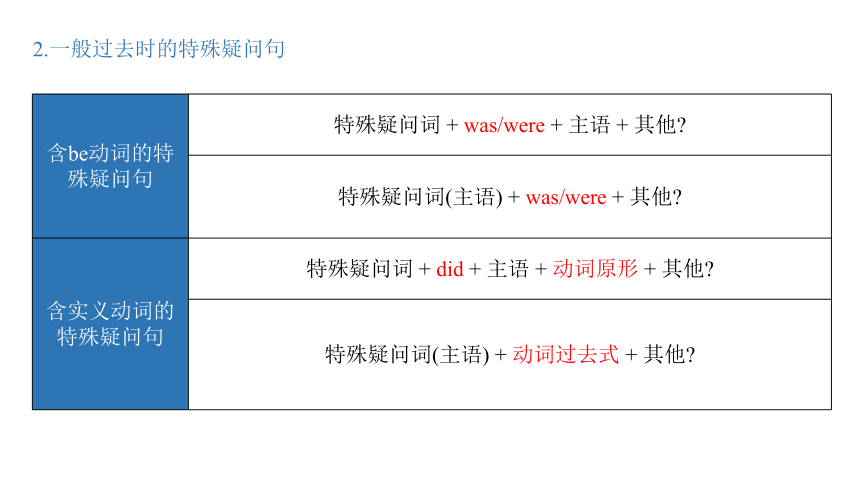
文档简介
(共43张PPT)
Unit 12
What did you do last weekend
第二课时Section A (Grammar Focus -3c)
类别 学习重点
重点单词及短语 away(adv.)离开;远离mouse(n.)老鼠;耗子baby(adj.)幼小的 (n.)婴儿shout(v.)呼叫;喊叫woof(interj.)(狗叫声)汪汪language(n.)语言run away跑开
shout at…冲……大声叫嚷
重点句式 1.—Where did she go last weekend?上周末她去哪了?
—She went to a farm.她去了一个农场。
2.—Who did she go with?她和谁一起去的?
—She went with her classmates.
她和她的同班同学一起去的。
Learning goals
What did you do last weekend
Where did you go last weekend
Who did you go with
How was the weather there
How was your last weekend
Warming up
Tom’s weekend
Guess and talk. Go!
Warming up
Am.
On ___________________,
He ___________________.
Saturday morning
went for a walk
Pm.
On ___________________,
He ________________and ________________.
Saturday afternoon
played badminton
went to the cinema
Pm.
On ___________________,
He ___________________and ___________.
Saturday night
did his homework
watched TV
Can you guess what Tom did on Sunday
Try to make sentences by yourself.
What did you do last weekend I did my homework./ We went boating.
Who visited her grandma Becky did.
Where did she go last weekend She went to a farm.
Who did she go with She went with her classmates.
Grammar Focus
.
.
.
.
.
.
.
.
.
.
.
.
.
.
.
.
.
.
.
.
.
.
.
.
.
.
.
.
.
.
.
.
.
.
.
.
.
.
.
.
.
.
.
.
.
.
.
.
.
.
.
.
.
.
.
.
.
.
.
.
.
.
.
.
.
.
.
.
.
.
.
.
.
.
.
.
.
.
.
.
.
.
.
.
.
.
.
.
.
.
.
.
.
.
.
.
.
.
.
.
1.一般过去时的用法
一般过去时 (II)
表示说话前所发生的动作。
Eg. He told us to pick apples.他让我们摘苹果。
表示过去所发生的一系列动作。
Eg. After school I hurried to ride my bike, got off the bike, put down my bag and went into the house.
放学后,我骑自行车赶回家,下车,放下我的书包,然后就进屋了。
讲述(过去的)故事或表示已故的人所做的事情。
rade Lei Feng did good deeds in his life.
雷锋同志在他的生命中总是做好事。
2.一般过去时的特殊疑问句
含be动词的特殊疑问句 特殊疑问词 + was/were + 主语 + 其他
特殊疑问词(主语) + was/were + 其他
含实义动词的特殊疑问句 特殊疑问词 + did + 主语 + 动词原形 + 其他
特殊疑问词(主语) + 动词过去式 + 其他
.
.
.
.
.
.
.
.
.
.
.
.
.
.
.
.
.
.
.
.
.
.
.
.
.
.
.
.
.
.
.
.
.
.
.
.
.
.
.
.
.
.
.
.
.
.
.
.
.
.
.
.
.
.
.
.
.
.
.
.
.
.
.
.
.
.
.
.
.
.
.
.
.
.
.
.
.
.
.
.
.
.
.
.
.
.
.
.
.
.
.
.
.
.
.
.
.
.
.
.
Practice
(1)① 上个周末你过得怎么样?
______ ______ your last weekend
② 昨天下午他们在哪里?
_______ _______ they yesterday afternoon
How was
Where were
.
.
.
.
.
.
.
.
.
.
.
.
.
.
.
.
.
.
.
.
.
.
.
.
.
.
.
.
.
.
.
.
.
.
.
.
.
.
.
.
.
.
.
.
.
.
.
.
.
.
.
.
.
.
.
.
.
.
.
.
.
.
.
.
.
.
.
.
.
.
.
.
.
.
.
.
.
.
.
.
.
.
.
.
.
.
.
.
.
.
.
.
.
.
.
.
.
.
.
.
③ 昨天晚上谁在教室里?
______ ______ in the classroom last night
④ 昨天你为什么迟到了?
______ _______ you late yesterday
Who was
Why were
.
.
.
.
.
.
.
.
.
.
.
.
.
.
.
.
.
.
.
.
.
.
.
.
.
.
.
.
.
.
.
.
.
.
.
.
.
.
.
.
.
.
.
.
.
.
.
.
.
.
.
.
.
.
.
.
.
.
.
.
.
.
.
.
.
.
.
.
.
.
.
.
.
.
.
.
.
.
.
.
.
.
.
.
.
.
.
.
.
.
.
.
.
.
.
.
.
.
.
.
(2)① 昨天他做了什么事情?
_______ ______ he do yesterday
② 上个周末她参观了什么地方?
______ ______ she ______ last weekend
What did
Where did visit
.
.
.
.
.
.
.
.
.
.
.
.
.
.
.
.
.
.
.
.
.
.
.
.
.
.
.
.
.
.
.
.
.
.
.
.
.
.
.
.
.
.
.
.
.
.
.
.
.
.
.
.
.
.
.
.
.
.
.
.
.
.
.
.
.
.
.
.
.
.
.
.
.
.
.
.
.
.
.
.
.
.
.
.
.
.
.
.
.
.
.
.
.
.
.
.
.
.
.
.
③ 你和谁一起去的动物园?
______ ______ you go to the zoo ______
④ 他们什么时候到达北京的?
_______ ______ they arrive in Beijing
Who did
with
When did
.
.
.
.
.
.
.
.
.
.
.
.
.
.
.
.
.
.
.
.
.
.
.
.
.
.
.
.
.
.
.
.
.
.
.
.
.
.
.
.
.
.
.
.
.
.
.
.
.
.
.
.
.
.
.
.
.
.
.
.
.
.
.
.
.
.
.
.
.
.
.
.
.
.
.
.
.
.
.
.
.
.
.
.
.
.
.
.
.
.
.
.
.
.
.
.
.
.
.
.
yesterday, yesterday morning(afternoon, evening), last weekend (year, week, month),in 1992, two weeks ago.
有时与连词 when,after,before,until等引
导的表示过去的时间状语连用。
3. 一般过去时的时间状语
一般过去时 一般现在时
用法不同 表示过去某个时间发生的动作或存在的状态。 I played badminton with my father last weekend. 我上周末和爸爸一起打羽毛球了。 表示经常发生或习惯性的动作或现在的状态。
I often play badminton with my father. 我经常和爸爸一起打羽毛球。
时间状语不同 一般过去时常与表示过去的时间状语连用,如last week、yesterday、 two days ago、 last month等。 He went to Japan last month. 他上个月去了日本。 一般现在时常与表示现在的时间状语连用,如 now、every day 等。
We read English every morning.
我们每天早上读英语。
一般过去时 一般现在时
谓语动词不同 谓语动词使用过去式,没有人称和数的变化( was和were除外) Julia did her homework and I did some reading after class yesterday. 昨天下课后,朱莉娅做家庭作业,我看书。 谓语动词有人称和数的变化。第三人称单数作主语时,谓语动词要使用第三人称单数形式(be动词用is);其他人称作主语时,则使用动词原形(be动词用am或are)。
My mother enjoys going shopping and I enjoy traveling. 我妈妈喜欢购物,而我喜欢旅行。
4. 比较:一般过去时和一般现在时
【特别提醒】通常情况下,一般现在时与频度副词连用,但一般过去时也可与频度副词连用,表示过去某个动作发生的频率。
He always played basketball with his classmates after school last term. 上学期每到放学后,他总是和同学一起打篮球。
3a
Fill in the blanks with who, what, when, where or how.
A: ______ did you do last weekend
B: I played badminton on Saturday.
A: Sounds fun! _______ did you play with
B: I played with my father. He’s really good!
What
Who
2. A: _______ was your weekend
B: It was great! I had so much fun!
A: ________ did you go
B: The weather was beautiful, so I went to the beach
with my parents.
How
Where
3. A: ______ did Jim lose
B: He lost his keys. He often loses things.
A: That’s too bad. ______ did he lose them
B: I heard it was yesterday.
What
When
3b
Complete the passage with the correct forms of the words in the box.
say be climb see run away
A family of mice were in the kitchen on Saturday morning when they _____ a big cat. Baby Mouse _______ afraid and ________ onto his father’s back.
跑开
老鼠,复数形式mice
Father Mouse shouted at the cat, “Woof, woof! ” The cat quickly _________. “Wow, Dad, you’re good!” ______ Baby Mouse. “Well, son, that’s why it’s important to learn a second language,” answered Father Mouse.
say be climb see run away
冲…… 大声叫嚷
shout / a t/ v. 呼叫;喊叫
say be climb see run away
A family of mice were in the kitchen on Saturday morning when they _____ a big cat. Baby Mouse _______ afraid and ________ onto his father’s back.
saw
was
climbed
Father Mouse shouted at the cat, “Woof, woof! ” The cat quickly _________. “Wow, Dad, you’re good!” ______ Baby Mouse. “Well, son, that’s why it’s important to learn a second language,” answered Father Mouse.
say be climb see run away
ran away
said
1. Father Mouse shouted at the cat, “Woof, woof!” 鼠爸爸冲着猫大叫:“汪汪,汪汪!” (教材P69 3b)
shout at... 指因生气或愤怒而冲着某人大声吼叫。
Don’t shout at others. 不要冲他人喊叫。
shout to...“对……大声喊叫”,目的是让别人听见。
Mary shouted to us to come in and help her.
玛丽大声喊我们进来帮助她。
Language points
away作副词,意为“远离, 离开, 消失”。常用短语:
far away(远离)
go away(走开)
run away(跑开)
right away(立刻, 马上)
away from(距……多远)。
2.【拓展】away的用法:
根据汉语提示填空。(1)Tom,stay (远离)from here,please.(2)It's only three kilometers (距……远)here.(3)The giraffe (跑开)at once when he saw the tiger.(4)He phoned his mother (马上).
away from
away from
run away
right away
Think of two things you did last weekend. Draw pictures of them. Your classmates guess what you did.
3c
.
.
.
.
.
.
.
.
.
.
.
.
.
.
.
.
.
.
.
.
.
.
.
.
.
.
.
.
.
.
.
.
.
.
.
.
.
.
.
.
.
.
.
.
.
.
.
.
.
.
.
.
.
.
.
.
.
.
.
.
.
.
.
.
.
.
.
.
.
.
.
.
.
.
.
.
.
.
.
.
.
.
.
.
.
.
.
.
.
.
.
.
.
.
.
.
.
.
.
.
You went to the cinema.
.
.
.
.
.
.
.
.
.
.
.
.
.
.
.
.
.
.
.
.
.
.
.
.
.
.
.
.
.
.
.
.
.
.
.
.
.
.
.
.
.
.
.
.
.
.
.
.
.
.
.
.
.
.
.
.
.
.
.
.
.
.
.
.
.
.
.
.
.
.
.
.
.
.
.
.
.
.
.
.
.
.
.
.
.
.
.
.
.
.
.
.
.
.
.
.
.
.
.
.
You went to the beach.
.
.
.
.
.
.
.
.
.
.
.
.
.
.
.
.
.
.
.
.
.
.
.
.
.
.
.
.
.
.
.
.
.
.
.
.
.
.
.
.
.
.
.
.
.
.
.
.
.
.
.
.
.
.
.
.
.
.
.
.
.
.
.
.
.
.
.
.
.
.
.
.
.
.
.
.
.
.
.
.
.
.
.
.
.
.
.
.
.
.
.
.
.
.
.
.
.
.
.
.
You did your homework.
.
.
.
.
.
.
.
.
.
.
.
.
.
.
.
.
.
.
.
.
.
.
.
.
.
.
.
.
.
.
.
.
.
.
.
.
.
.
.
.
.
.
.
.
.
.
.
.
.
.
.
.
.
.
.
.
.
.
.
.
.
.
.
.
.
.
.
.
.
.
.
.
.
.
.
.
.
.
.
.
.
.
.
.
.
.
.
.
.
.
.
.
.
.
.
.
.
.
.
.
— What did you do for your dad on Father’s Day this year
— I ______ a beautiful tie for him.
A. buy B. bought C. buys D. buying
I.单项选择。
Exercises
2. — So you have watched the action movie, haven’t you
— Yes. I _______ it with my parents in Lu Xun Theatre.
A. watch B. watched
C. will watch D. am watching
.
.
.
.
.
.
.
.
.
.
.
.
.
.
.
.
.
.
.
.
.
.
.
.
.
.
.
.
.
.
.
.
.
.
.
.
.
.
.
.
.
.
.
.
.
.
.
.
.
.
.
.
.
.
.
.
.
.
.
.
.
.
.
.
.
.
.
.
.
.
.
.
.
.
.
.
.
.
.
.
.
.
.
.
.
.
.
.
.
.
.
.
.
.
.
.
.
.
.
.
3. My uncle had a new car. He ______ 98,000 yuan on it.
A. spend B. spent
C. spends D. is spending
4. —Did you go shopping with your mother
— ________.
A. Yes, I didn’t B. No, I didn’t
C. Yes, I do. D. No, I did
5. — When ______ your father ______ a new bike for you
— Two weeks ago.
A. did, buy B. does, buy
C. did, bought D. does, bought
6. The Greens _______ to the beach last Sunday and _____
a great time there.
A. went, have B. go, had C. go, have D. went, had
—________ were you so sad — Because I failed the exam.
— __________ did you go just now — I went to the library.
II.用特殊疑问词填空。
Why
Where
.
.
.
.
.
.
.
.
.
.
.
.
.
.
.
.
.
.
.
.
.
.
.
.
.
.
.
.
.
.
.
.
.
.
.
.
.
.
.
.
.
.
.
.
.
.
.
.
.
.
.
.
.
.
.
.
.
.
.
.
.
.
.
.
.
.
.
.
.
.
.
.
.
.
.
.
.
.
.
.
.
.
.
.
.
.
.
.
.
.
.
.
.
.
.
.
.
.
.
.
3. — _______ did you go to school last year
— I went to school from Monday to Friday.
4. —_______ did Tom go to Beijing
— By plane.
5. — _______ country did you visit last year
— England.
Which
When
How
Summary
away, mouse, baby, shout, woof, language
Useful expressions
run away, shout at...
Grammar
一般过去时(Ⅱ)
Key words
Homework
练一练: 对下列句子中的划线部分提问。1. I got up at nine yesterday morning. _____ ______ you get up yesterday morning 2. We did our homework last night. ______ ______ you _______ last night 3. They were in the supermarket last Sunday. ______ _______ they last Sunday 4. My last weekend was kind of boring. ______ _____ your last weekend 5. Linda took a walk with her parents after dinner. _____ ____ Linda take a walk with after dinner
THANKS
Unit 12
What did you do last weekend
第二课时Section A (Grammar Focus -3c)
类别 学习重点
重点单词及短语 away(adv.)离开;远离mouse(n.)老鼠;耗子baby(adj.)幼小的 (n.)婴儿shout(v.)呼叫;喊叫woof(interj.)(狗叫声)汪汪language(n.)语言run away跑开
shout at…冲……大声叫嚷
重点句式 1.—Where did she go last weekend?上周末她去哪了?
—She went to a farm.她去了一个农场。
2.—Who did she go with?她和谁一起去的?
—She went with her classmates.
她和她的同班同学一起去的。
Learning goals
What did you do last weekend
Where did you go last weekend
Who did you go with
How was the weather there
How was your last weekend
Warming up
Tom’s weekend
Guess and talk. Go!
Warming up
Am.
On ___________________,
He ___________________.
Saturday morning
went for a walk
Pm.
On ___________________,
He ________________and ________________.
Saturday afternoon
played badminton
went to the cinema
Pm.
On ___________________,
He ___________________and ___________.
Saturday night
did his homework
watched TV
Can you guess what Tom did on Sunday
Try to make sentences by yourself.
What did you do last weekend I did my homework./ We went boating.
Who visited her grandma Becky did.
Where did she go last weekend She went to a farm.
Who did she go with She went with her classmates.
Grammar Focus
.
.
.
.
.
.
.
.
.
.
.
.
.
.
.
.
.
.
.
.
.
.
.
.
.
.
.
.
.
.
.
.
.
.
.
.
.
.
.
.
.
.
.
.
.
.
.
.
.
.
.
.
.
.
.
.
.
.
.
.
.
.
.
.
.
.
.
.
.
.
.
.
.
.
.
.
.
.
.
.
.
.
.
.
.
.
.
.
.
.
.
.
.
.
.
.
.
.
.
.
1.一般过去时的用法
一般过去时 (II)
表示说话前所发生的动作。
Eg. He told us to pick apples.他让我们摘苹果。
表示过去所发生的一系列动作。
Eg. After school I hurried to ride my bike, got off the bike, put down my bag and went into the house.
放学后,我骑自行车赶回家,下车,放下我的书包,然后就进屋了。
讲述(过去的)故事或表示已故的人所做的事情。
rade Lei Feng did good deeds in his life.
雷锋同志在他的生命中总是做好事。
2.一般过去时的特殊疑问句
含be动词的特殊疑问句 特殊疑问词 + was/were + 主语 + 其他
特殊疑问词(主语) + was/were + 其他
含实义动词的特殊疑问句 特殊疑问词 + did + 主语 + 动词原形 + 其他
特殊疑问词(主语) + 动词过去式 + 其他
.
.
.
.
.
.
.
.
.
.
.
.
.
.
.
.
.
.
.
.
.
.
.
.
.
.
.
.
.
.
.
.
.
.
.
.
.
.
.
.
.
.
.
.
.
.
.
.
.
.
.
.
.
.
.
.
.
.
.
.
.
.
.
.
.
.
.
.
.
.
.
.
.
.
.
.
.
.
.
.
.
.
.
.
.
.
.
.
.
.
.
.
.
.
.
.
.
.
.
.
Practice
(1)① 上个周末你过得怎么样?
______ ______ your last weekend
② 昨天下午他们在哪里?
_______ _______ they yesterday afternoon
How was
Where were
.
.
.
.
.
.
.
.
.
.
.
.
.
.
.
.
.
.
.
.
.
.
.
.
.
.
.
.
.
.
.
.
.
.
.
.
.
.
.
.
.
.
.
.
.
.
.
.
.
.
.
.
.
.
.
.
.
.
.
.
.
.
.
.
.
.
.
.
.
.
.
.
.
.
.
.
.
.
.
.
.
.
.
.
.
.
.
.
.
.
.
.
.
.
.
.
.
.
.
.
③ 昨天晚上谁在教室里?
______ ______ in the classroom last night
④ 昨天你为什么迟到了?
______ _______ you late yesterday
Who was
Why were
.
.
.
.
.
.
.
.
.
.
.
.
.
.
.
.
.
.
.
.
.
.
.
.
.
.
.
.
.
.
.
.
.
.
.
.
.
.
.
.
.
.
.
.
.
.
.
.
.
.
.
.
.
.
.
.
.
.
.
.
.
.
.
.
.
.
.
.
.
.
.
.
.
.
.
.
.
.
.
.
.
.
.
.
.
.
.
.
.
.
.
.
.
.
.
.
.
.
.
.
(2)① 昨天他做了什么事情?
_______ ______ he do yesterday
② 上个周末她参观了什么地方?
______ ______ she ______ last weekend
What did
Where did visit
.
.
.
.
.
.
.
.
.
.
.
.
.
.
.
.
.
.
.
.
.
.
.
.
.
.
.
.
.
.
.
.
.
.
.
.
.
.
.
.
.
.
.
.
.
.
.
.
.
.
.
.
.
.
.
.
.
.
.
.
.
.
.
.
.
.
.
.
.
.
.
.
.
.
.
.
.
.
.
.
.
.
.
.
.
.
.
.
.
.
.
.
.
.
.
.
.
.
.
.
③ 你和谁一起去的动物园?
______ ______ you go to the zoo ______
④ 他们什么时候到达北京的?
_______ ______ they arrive in Beijing
Who did
with
When did
.
.
.
.
.
.
.
.
.
.
.
.
.
.
.
.
.
.
.
.
.
.
.
.
.
.
.
.
.
.
.
.
.
.
.
.
.
.
.
.
.
.
.
.
.
.
.
.
.
.
.
.
.
.
.
.
.
.
.
.
.
.
.
.
.
.
.
.
.
.
.
.
.
.
.
.
.
.
.
.
.
.
.
.
.
.
.
.
.
.
.
.
.
.
.
.
.
.
.
.
yesterday, yesterday morning(afternoon, evening), last weekend (year, week, month),in 1992, two weeks ago.
有时与连词 when,after,before,until等引
导的表示过去的时间状语连用。
3. 一般过去时的时间状语
一般过去时 一般现在时
用法不同 表示过去某个时间发生的动作或存在的状态。 I played badminton with my father last weekend. 我上周末和爸爸一起打羽毛球了。 表示经常发生或习惯性的动作或现在的状态。
I often play badminton with my father. 我经常和爸爸一起打羽毛球。
时间状语不同 一般过去时常与表示过去的时间状语连用,如last week、yesterday、 two days ago、 last month等。 He went to Japan last month. 他上个月去了日本。 一般现在时常与表示现在的时间状语连用,如 now、every day 等。
We read English every morning.
我们每天早上读英语。
一般过去时 一般现在时
谓语动词不同 谓语动词使用过去式,没有人称和数的变化( was和were除外) Julia did her homework and I did some reading after class yesterday. 昨天下课后,朱莉娅做家庭作业,我看书。 谓语动词有人称和数的变化。第三人称单数作主语时,谓语动词要使用第三人称单数形式(be动词用is);其他人称作主语时,则使用动词原形(be动词用am或are)。
My mother enjoys going shopping and I enjoy traveling. 我妈妈喜欢购物,而我喜欢旅行。
4. 比较:一般过去时和一般现在时
【特别提醒】通常情况下,一般现在时与频度副词连用,但一般过去时也可与频度副词连用,表示过去某个动作发生的频率。
He always played basketball with his classmates after school last term. 上学期每到放学后,他总是和同学一起打篮球。
3a
Fill in the blanks with who, what, when, where or how.
A: ______ did you do last weekend
B: I played badminton on Saturday.
A: Sounds fun! _______ did you play with
B: I played with my father. He’s really good!
What
Who
2. A: _______ was your weekend
B: It was great! I had so much fun!
A: ________ did you go
B: The weather was beautiful, so I went to the beach
with my parents.
How
Where
3. A: ______ did Jim lose
B: He lost his keys. He often loses things.
A: That’s too bad. ______ did he lose them
B: I heard it was yesterday.
What
When
3b
Complete the passage with the correct forms of the words in the box.
say be climb see run away
A family of mice were in the kitchen on Saturday morning when they _____ a big cat. Baby Mouse _______ afraid and ________ onto his father’s back.
跑开
老鼠,复数形式mice
Father Mouse shouted at the cat, “Woof, woof! ” The cat quickly _________. “Wow, Dad, you’re good!” ______ Baby Mouse. “Well, son, that’s why it’s important to learn a second language,” answered Father Mouse.
say be climb see run away
冲…… 大声叫嚷
shout / a t/ v. 呼叫;喊叫
say be climb see run away
A family of mice were in the kitchen on Saturday morning when they _____ a big cat. Baby Mouse _______ afraid and ________ onto his father’s back.
saw
was
climbed
Father Mouse shouted at the cat, “Woof, woof! ” The cat quickly _________. “Wow, Dad, you’re good!” ______ Baby Mouse. “Well, son, that’s why it’s important to learn a second language,” answered Father Mouse.
say be climb see run away
ran away
said
1. Father Mouse shouted at the cat, “Woof, woof!” 鼠爸爸冲着猫大叫:“汪汪,汪汪!” (教材P69 3b)
shout at... 指因生气或愤怒而冲着某人大声吼叫。
Don’t shout at others. 不要冲他人喊叫。
shout to...“对……大声喊叫”,目的是让别人听见。
Mary shouted to us to come in and help her.
玛丽大声喊我们进来帮助她。
Language points
away作副词,意为“远离, 离开, 消失”。常用短语:
far away(远离)
go away(走开)
run away(跑开)
right away(立刻, 马上)
away from(距……多远)。
2.【拓展】away的用法:
根据汉语提示填空。(1)Tom,stay (远离)from here,please.(2)It's only three kilometers (距……远)here.(3)The giraffe (跑开)at once when he saw the tiger.(4)He phoned his mother (马上).
away from
away from
run away
right away
Think of two things you did last weekend. Draw pictures of them. Your classmates guess what you did.
3c
.
.
.
.
.
.
.
.
.
.
.
.
.
.
.
.
.
.
.
.
.
.
.
.
.
.
.
.
.
.
.
.
.
.
.
.
.
.
.
.
.
.
.
.
.
.
.
.
.
.
.
.
.
.
.
.
.
.
.
.
.
.
.
.
.
.
.
.
.
.
.
.
.
.
.
.
.
.
.
.
.
.
.
.
.
.
.
.
.
.
.
.
.
.
.
.
.
.
.
.
You went to the cinema.
.
.
.
.
.
.
.
.
.
.
.
.
.
.
.
.
.
.
.
.
.
.
.
.
.
.
.
.
.
.
.
.
.
.
.
.
.
.
.
.
.
.
.
.
.
.
.
.
.
.
.
.
.
.
.
.
.
.
.
.
.
.
.
.
.
.
.
.
.
.
.
.
.
.
.
.
.
.
.
.
.
.
.
.
.
.
.
.
.
.
.
.
.
.
.
.
.
.
.
.
You went to the beach.
.
.
.
.
.
.
.
.
.
.
.
.
.
.
.
.
.
.
.
.
.
.
.
.
.
.
.
.
.
.
.
.
.
.
.
.
.
.
.
.
.
.
.
.
.
.
.
.
.
.
.
.
.
.
.
.
.
.
.
.
.
.
.
.
.
.
.
.
.
.
.
.
.
.
.
.
.
.
.
.
.
.
.
.
.
.
.
.
.
.
.
.
.
.
.
.
.
.
.
.
You did your homework.
.
.
.
.
.
.
.
.
.
.
.
.
.
.
.
.
.
.
.
.
.
.
.
.
.
.
.
.
.
.
.
.
.
.
.
.
.
.
.
.
.
.
.
.
.
.
.
.
.
.
.
.
.
.
.
.
.
.
.
.
.
.
.
.
.
.
.
.
.
.
.
.
.
.
.
.
.
.
.
.
.
.
.
.
.
.
.
.
.
.
.
.
.
.
.
.
.
.
.
.
— What did you do for your dad on Father’s Day this year
— I ______ a beautiful tie for him.
A. buy B. bought C. buys D. buying
I.单项选择。
Exercises
2. — So you have watched the action movie, haven’t you
— Yes. I _______ it with my parents in Lu Xun Theatre.
A. watch B. watched
C. will watch D. am watching
.
.
.
.
.
.
.
.
.
.
.
.
.
.
.
.
.
.
.
.
.
.
.
.
.
.
.
.
.
.
.
.
.
.
.
.
.
.
.
.
.
.
.
.
.
.
.
.
.
.
.
.
.
.
.
.
.
.
.
.
.
.
.
.
.
.
.
.
.
.
.
.
.
.
.
.
.
.
.
.
.
.
.
.
.
.
.
.
.
.
.
.
.
.
.
.
.
.
.
.
3. My uncle had a new car. He ______ 98,000 yuan on it.
A. spend B. spent
C. spends D. is spending
4. —Did you go shopping with your mother
— ________.
A. Yes, I didn’t B. No, I didn’t
C. Yes, I do. D. No, I did
5. — When ______ your father ______ a new bike for you
— Two weeks ago.
A. did, buy B. does, buy
C. did, bought D. does, bought
6. The Greens _______ to the beach last Sunday and _____
a great time there.
A. went, have B. go, had C. go, have D. went, had
—________ were you so sad — Because I failed the exam.
— __________ did you go just now — I went to the library.
II.用特殊疑问词填空。
Why
Where
.
.
.
.
.
.
.
.
.
.
.
.
.
.
.
.
.
.
.
.
.
.
.
.
.
.
.
.
.
.
.
.
.
.
.
.
.
.
.
.
.
.
.
.
.
.
.
.
.
.
.
.
.
.
.
.
.
.
.
.
.
.
.
.
.
.
.
.
.
.
.
.
.
.
.
.
.
.
.
.
.
.
.
.
.
.
.
.
.
.
.
.
.
.
.
.
.
.
.
.
3. — _______ did you go to school last year
— I went to school from Monday to Friday.
4. —_______ did Tom go to Beijing
— By plane.
5. — _______ country did you visit last year
— England.
Which
When
How
Summary
away, mouse, baby, shout, woof, language
Useful expressions
run away, shout at...
Grammar
一般过去时(Ⅱ)
Key words
Homework
练一练: 对下列句子中的划线部分提问。1. I got up at nine yesterday morning. _____ ______ you get up yesterday morning 2. We did our homework last night. ______ ______ you _______ last night 3. They were in the supermarket last Sunday. ______ _______ they last Sunday 4. My last weekend was kind of boring. ______ _____ your last weekend 5. Linda took a walk with her parents after dinner. _____ ____ Linda take a walk with after dinner
THANKS
同课章节目录
- Unit 1 Can you play the guitar?
- Section A
- Section B
- Unit 2 What time do you go to school?
- Section A
- Section B
- Unit 3 How do you get to school?
- Section A
- Section B
- Unit 4 Don't eat in class.
- Section A
- Section B
- Unit 5 Why do you like pandas?
- Section A
- Section B
- Unit 6 I'm watching TV.
- Section A
- Section B
- Review of Units 1-6
- Unit 7 It's raining!
- Section A
- Section B
- Unit 8 Is there a post office near here?
- Section A
- Section B
- Unit 9 What does he look like?
- Section A
- Section B
- Unit 10 I'd like some noodles.
- Section A
- Section B
- Unit 11 How was your school trip?
- Section A
- Section B
- Unit 12 What did you do last weekend?
- Section A
- Section B
